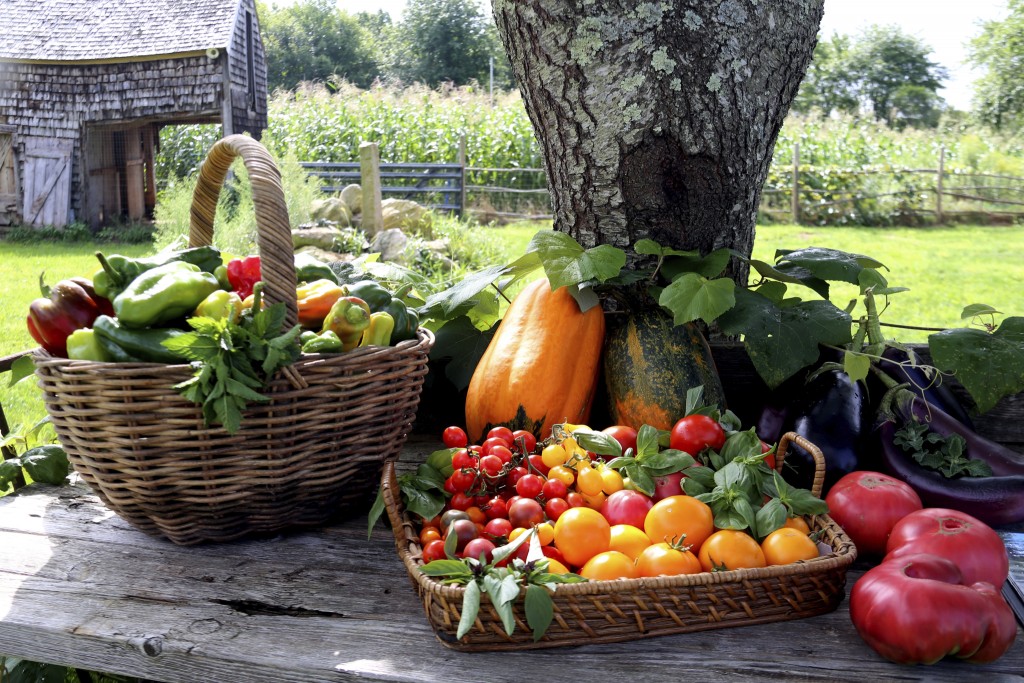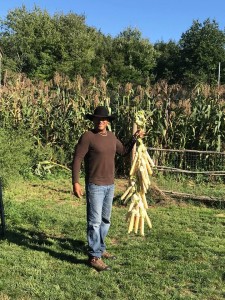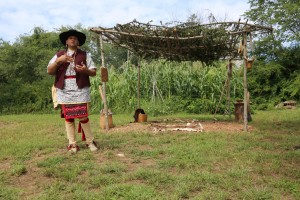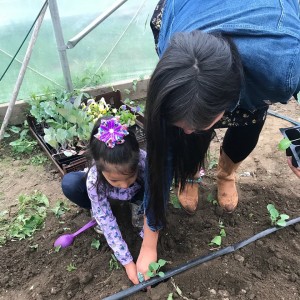 The majority of indigenous cultures across the Americas have long been highly skilled arable farmers, and it was among these societies that vegetal breeding and domestication was first discovered, as well as the cultivation of plants for an array of medical purposes still in use today. In RI, 14,000 years of knowledge is still in use at the Narragansett Food Sovereignty Initiative at Crandall “Minacommuck” Farm in Westerly. I donned a pair of rubber boots and headed out to speak with the founders, Narragansett tribal members Dawn Dove and Cassius Spears.
The majority of indigenous cultures across the Americas have long been highly skilled arable farmers, and it was among these societies that vegetal breeding and domestication was first discovered, as well as the cultivation of plants for an array of medical purposes still in use today. In RI, 14,000 years of knowledge is still in use at the Narragansett Food Sovereignty Initiative at Crandall “Minacommuck” Farm in Westerly. I donned a pair of rubber boots and headed out to speak with the founders, Narragansett tribal members Dawn Dove and Cassius Spears.
Amadeus Finlay (Motif): Why did you start the farm?
Cassius Spears: We started the Narragansett Food Sovereignty Initiative to offer a space for our Narragansett people to provide food, health and wellness through sustainable agriculture, community involvement and cultural and educational programs.
AF: What traditional agricultural practices do you employ at the Narragansett Food Sovereignty Initiative?
Dawn Dove: The first thing is that we are focused on community.
 CS: Our traditional agricultural practice is a more knowledge-based conservation approach; we work with the environment. Our traditional ecological knowledge is centered around our conservation practices; one perfect example is in our planting of the three sisters: corn, beans and squash.
CS: Our traditional agricultural practice is a more knowledge-based conservation approach; we work with the environment. Our traditional ecological knowledge is centered around our conservation practices; one perfect example is in our planting of the three sisters: corn, beans and squash.
DD: Three sisters gardening is companion planting in today’s terms.
We consider all stages of our plants to be sacred — when planting, when harvesting — these steps include prayers, songs and ceremony. The plants are our sisters and we have to nurture and watch over them just like we do for our younger siblings.
CS: This year, Narraganset flint corn was planted as a medicine, not as a food, that has brought community connectedness.
AF: Where can people purchase your produce?
CS: There are many phases in the development of this farm. Up to this point, the farm has been in the engagement phase, building infrastructure.
DD: We do have a limited supply of summer produce available at local farmers markets, however. Proceeds support the farm and the community programs.
AF: Is the United States doing right by the environment?
DD: The majority of the environmental problems that we face today are a direct result of errors made in the past and lack of interest in the future or sustainability of the planet. If we look at ourselves as keepers of the land — protectors — it’s not ours; it’s our great great grandchildren’s children who we have to consider.
CS: Every environment will speak for itself if you take the time to look, listen and feel; the answer will be there. We believe that what we do is for our children’s children.
AF: What are the Seven Generations, and why do they remain at the forefront of indigenous thinking when it comes to environmental practices?
DD: It’s exactly what we have been talking about, that we must live in harmony with our natural world.
CS: We cannot forget that our actions affect the future, the next seven generations. What we are building at the farm is for the future.
 DD: Becoming grandparents has a profound effect on you — you truly see your family, and that next generation. With us, it became the guiding force; we have to make change in our community, because if we can’t we will be lost in the mix of the dominant society.
DD: Becoming grandparents has a profound effect on you — you truly see your family, and that next generation. With us, it became the guiding force; we have to make change in our community, because if we can’t we will be lost in the mix of the dominant society.
CS: We carry a baton, a gift of life for the generations to come. It’s our responsibility to hold tight to that baton, and not to drop it.
AF: What are the greatest lessons that working the land has taught you?
CS: That the ancestors were right; the greatest lesson is that everything is connected. No pun intended, but it keeps you grounded. Reciprocity — if you’re good to the land it will be good to you.
DD: You are connected to something that you will never own and was never meant to be owned; you’re just caring for it for your future generations.
CS: That thought process of ownership isn’t a priority when your mind is focused on the conservation side of it. But finally, that the greatest gift is life.
More Posts by The Author:
Tens of Leaves Down: Henri aftermath report
The Fourth Arena: Carry-on cartography
The Fourth Arena: Longer Flights of Fancy
A Life Back Home: Local veteran helps ease the transition for fellow military members
The Indian Wars: America’s longest war
